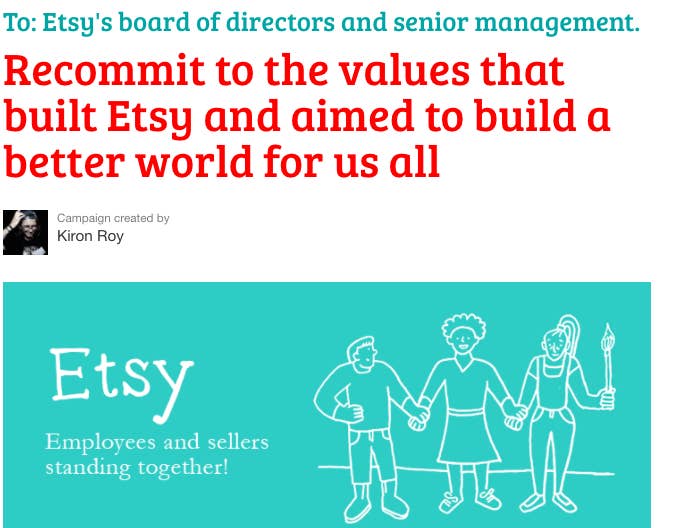
Two years after an unimpressive IPO, Etsy fired its CEO and restructured the company in hopes of increasing revenue and putting the company on the path toward greater profitability. These efforts, which included laying off nearly a quarter of its staff so far this year, seem to be working, based on a positive earnings report released earlier today. But some of Etsy’s approximately 800 employees aren’t happy with the direction of the company, and around a dozen employees have drafted a public petition demanding change. Fifty people have signed it so far.
“We believe these changes represent a move away from Etsy’s mission and values, and we are feeling uncertain about what the future holds for us as Etsy employees and for Etsy’s community of creative entrepreneurs,” the employee petition reads. It was published by Etsy engineer Kiron Roy earlier this week, and is said to represent the interests of both Etsy employees and the independent artists and crafters who sell their goods on the site.
Employees supporting the petition have five main requests for Etsy’s board of directors and executive team: a plan to provide health insurance for some of the people who sell goods on Etsy, reassurance that Etsy’s six-month parental leave policy won’t be dismantled, transparency around severance packages, a recommitment to Etsy’s environmental sustainability goals, and an open discussion about widespread restructuring within the company, including the dissolution of specific teams and projects.
“There have been large changes at Etsy that affect every employee’s life, and there continue to be changes in the works that we have no visibility into. I don’t think we’re asking for control over every little thing that happens, but I think we feel uncertain in our day-to-day jobs,” Roy told BuzzFeed News. “There’s a lot of uncertainty about how long these structural changes might last, and I think that the essential radio silence from the leadership team didn't do anything to help employees work through that uncertainty.”
For much of its 12-year history, Etsy has been trying to build a sustainable, responsible, socially conscious startup inside an industry known for its cutthroat capitalism. In 2012, it was officially designated as a B Corp, which means it met certain standards around diversity, environmentalism, and economic impact. In a profile last year, New York Magazine described Etsy’s Brooklyn headquarters as “an extremely cozy private welfare state.”
But as Bloomberg reported in May, support for Etsy’s unusually anti-corporate way of doing things started to wane after the company went public in 2015. Etsy’s unimpressive stock performance caught the eye of tech investor Seth Wunder, who bought up Etsy shares and used his stake to push the company toward a more traditional management style, demanding less spending on social-good issues.
In May, shortly after Wunder presented his requests to Etsy’s board, Chad Dickerson was fired as CEO and 80 employees were laid off. In June, 150 more employees were laid off; at the time, new Etsy CEO Josh Silverman said the company would be “moving forward with a more nimble structure that supports our current business needs.”
“Etsy was endeavoring to change the way the world did business,” writes Jed B., one of the employees who signed the petition, “but in recent months leadership has seemed more interested in doing what everyone else is already doing.”
A spokesperson said Etsy is “aware of the petition” but doesn’t “comment publicly on internal company discussions.”
Roy said he’s had multiple one-on-one meetings with leaders inside Etsy since the petition first went public. He described those conversations as “genial,” saying, “I think they understand that this is not about us versus them.” But he says the issues raised in the petition need to be addressed with all employees.
“Many of us joined Etsy specifically because we viewed it as a company that treats its values seriously. We put our values into our filing for for initial public offering as risk factors, saying, ‘We’re going to be living up to our values, and that’s a risk you have to understand if you’re going to invest in Etsy,’” Roy said. “As an engineer, I prefer to work at Etsy versus some other company where I could make more money because I believe it’s a value-led, ethical company.”
